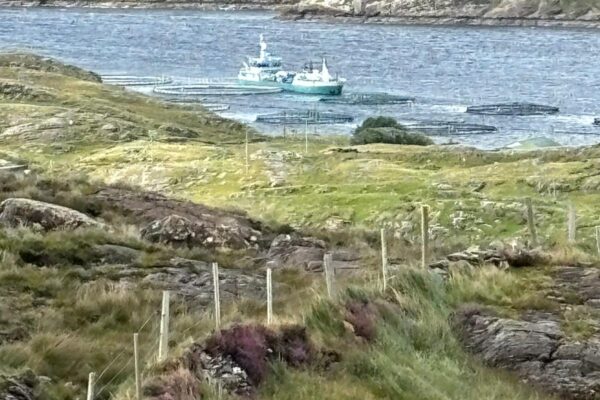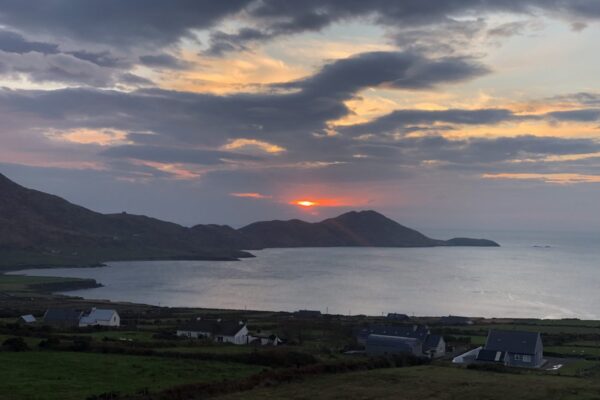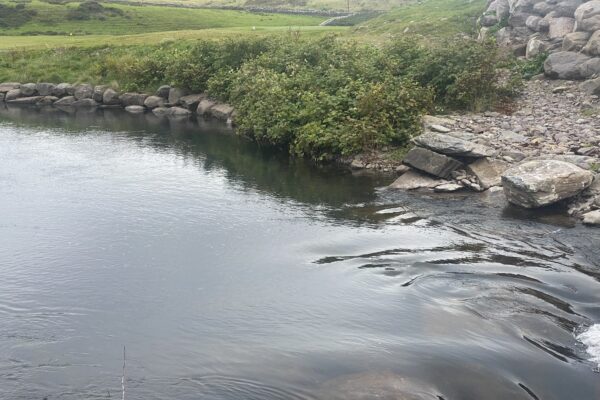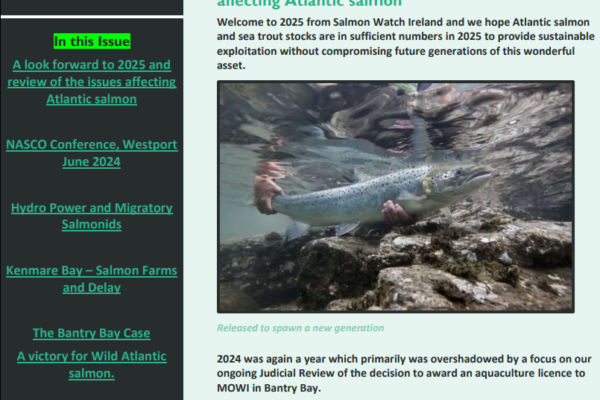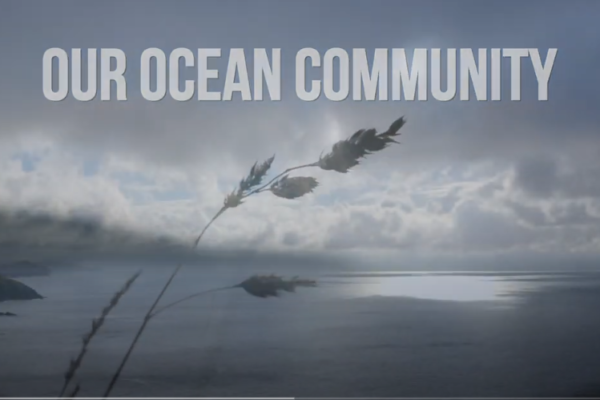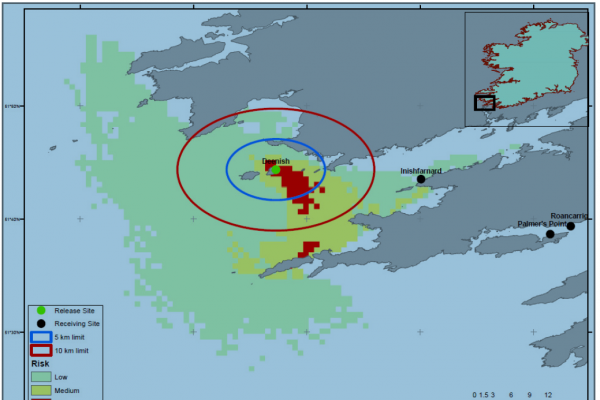-
Latest Update – Issue number 10 – 16 April 2025
This update concerns an update on Straffan Weir and an examination of a refusal to grant information pertaining to mortality figures, stocking rates etc. We have just been informed that our appeal has not been upheld and we will have to appeal to the information commissioner. We fully intend to do this. We certainly feel that the process of public consultation has been effectively usurped by the Department of Agriculture, Food and the Marine. This will certainly be challenged in court if the need arises and certainly would suggest that the public is being effectively blinded to full factual information concerning these public licenses.
Continue reading -
Update 18 March 2025
Waterville Fishery: A look back at research in the period 1980 - 1986 It is calamitous that the fishery now has few sea trout and to repeat this research may not be possible today. Certainly, a situation which can be rescued but only with your help.
Continue reading -
Newsletter 28 February 25 Salmon Watch Ireland
This newsletter deals with Section 19A (4) of the 1997 Fisheries Act which is to be deleted from Irish Legislation. Please click on image below
Continue reading -
Update 27 January 2025 – Salmon Watch Ireland
Please find an update from Salmon Watch Ireland. The following topics discussed include the newest study on the removal of salmon farms in British Columbia which appears to have heralded an extremely positive effect on Chum salmon. We also explain the tagging and sampling program at Greenland which is a very important aspect of understanding how salmon migrate and how salmon from both North America and Europe mix in this area. The discovery of a salmon in the Erriff river which was tagged at Greenland is interesting and demonstrates the value of these projects in understanding migration and feeding regimes for MSW salmon.
Continue reading -
Newsletter 2025 – Salmon Watch Ireland
Please find a PDF copy SWIRL NEWSLETTER 12025 of the newsletter as published today. We anticipate that you may find it of interest. In this issue we among other subjects examine the effect of hydro schemes and the various turbines associated with the many hydro systems around Ireland. It is a subject that we all should be informed about and vigilant about, as there is a renewed interest in the construction of facilities which will impact on salmonid mortality and production. We have also put together a video highlighting the demise of the iconic sea trout in Waterville and ask the simple question as to why. This video was co-produced with Currane fisheries, and we appreciate their support. With the ongoing transition to closed containment and closure of open cage salmon farms in British Columbia and Washington state and the apparent improvement in wild salmon numbers there, it is essential, that we progress in eliminating open cage farming and shift the dialogue towards closed containment or indeed complete closure if the industry does not facilitate this. Essentially we are approaching a period whereby open cage salmon farming may be about to expand and it is probably one of the last opportunities that we have to shape policy to protect wild salmonids and we need your support and ongoing efforts to steer our campaigns into the future. We hope you will find the content interesting. Please distribute as widely as possible.
Continue reading -
Weekly Update 04 January 2025
Welcome to 2025 from Salmon Watch Ireland. We will be publishing our annual look back at all things wild Atlantic salmon and sea trout in the coming weeks. We hope you will find it interesting and that 2025 will see some progress on many issues to be highlighted. We understand that many catchments did see some improvement in grilse stocks but that multi sea winter salmon stocks were to say the least very disappointing. The same man made issues persist with salmon farming and water quality high on the suspect list pertaining to survival. However the most pressing issues (many beyond our control) are at sea but we all can play our part in allowing more salmon spawn in 2025. The spectre of climate related warming of the seas on the southwestern coast of Ireland is certainly being felt by the salmon farming industry. There are two salmon farms presently operating in Kenmare Bay. The mortality of farmed salmon on both these farms is to say the least extraordinary. Our recent submission throws some light on the extent of mortalities. Deenish Island and Inishfarnard. The total mortality figures contained in the Aquaculture Stewardship Council (ASC) reports note exceptional rates of up to 45.8% and 46.9% on Deenish and Inishfarnard respectively which obviously demonstrate a substantial animal welfare issue at the site. While environmental challenges exist presently due to higher water temperatures it is abundantly clear that this will only get worse as climatic conditions deteriorate. Harmful algal blooms, sea lice and jellyfish infestation will only be amplified by declining marine conditions. The total mortality figures reported by MOWI to ASC were as follows for Deenish: production cycle 2013 (36.4%), 2015 (45.8%), 2017 (23.9%), 2019 (28.9%) and 2021 (32.2%) This is well above the figures reported in Scotland and Norway. The mortality rate on Inishfarnard has fluctuated widely with the 2014 cycle (46.19%), 2016 (12.3%), 2018 (unknown), 2020 (44.1%). The many causes of mortality include Pancreas Disease , Amoebic Gill Disease, Sea Lice Damage, Early Maturation, Jellyfish, Harmful Algal Blooms. This could in all probability be in the region of up to a two million farmed salmon mortalities in the last decade. A question to be asked is how do these mortality figures affect wild salmonids. Moribund fish on the farms are certainly more at risk of parasitic infestation while also being affected by the causative agents which cause amoebic gill disease. It is believed that sea trout due to their near coastal residence are prone to AGD and repeat infestation by sea lice from these farms. It is worth noting that sea trout angling returns fell from over 500 seatrout(over 40cm) in 2009 to a low of 81 fish in 2022 in the Waterville fishery. The 2009 figure was coincidently the year before the salmon farms reopened after a fallowing period since 2005. The table from Burishoole demonstrates how a sea trout population is effectively eradicated. No explanation from the Marine Institute as to the cause. Coincided with the salmon farm industry opening and expanding in Clew Bay in the 1980's. Exploitation 2025 While the angling community has been steadfast in their approach to conservation we are disappointed that the recent Salmon and Sea Trout Tagging regulations did not take our views onboard concerning both commercial and recreational exploitation. We do know that Inland Fisheries Ireland do agree that there needs to be a more proactive approach to the management of exploitation and that stocks should primarily be managed for conservation. This does not mean that exploitation cannot be allowed but a more nuanced approach is required to conserve the larger fish which after all are the drivers of population going forward. We are again asking the angling community to voluntarily restrict their harvesting of salmon. Our submission included the following points which we will again be discussing with Inland Fisheries Ireland going forward. We strongly assert that there needs to be a substantial re-examination of the data which undermines the provision of scientific advice in regard to the attainment of conservation limits especially where data is derived from recreational angling returns. The usage of non—return of licences as a means to determine unreported catches is not desirable or is the usage of this data justified to raise catches. Anecdotal evidence would suggest that this data is not accurate. We again would strongly suggest that real time reporting of catches be facilitated through an online portal. This should be an immediate priority even without the provision of the promised digital licencing system. The electro-fishing programme must be expanded substantially both in catchment area, increased regularity, and number of catchments in order to give more robust data in facilitating stock analysis. There is certainly a case for citizen science playing a part in process with training being given by Inland Fisheries Ireland. While the actual electro fishing activity is a highly skilled process it should be possible to include stakeholder groups to carry out certain tasks associated with the fishery and free up numbers of staff to expand the geographic range of the annual program. In regard to exploitation, we would suggest the following for the recreational sector: • As MSW salmon are the most important fish to protect it is essential that more stringent limits apply. It is our opinion that one salmon per angler in the period up to 11 May 2025 should be introduced. • A maximum size limit should be introduced outside this period to protect MSW fish. We suggest a 65cm limit. • A limit of one fish per day should be introduced from 12 May to end of August. • Harvesting of salmon in September should not be facilitated. • All angling should be carried out with catch and release to the forefront which suggests that methods should be restricted which give salmon best chance of survival. Single / Double Barbless hooks etc. • The provision of ten tags to anglers is certainly not desirable considering the dramatic decline in stocks. We suggest this number be reduced. • With regard to commercial salmon exploitation, it is our contention that a commercial fishery moratorium be considered as an interim measure. An immediate examination on how to eliminate the commercial harvest of salmon should be examined with public netting licences to be time limited by way of government order (Similar to net limitation order in UK). The purchase of private netting interests should proceed without delay. If a commercial fishery is to be prosecuted in 2025 it is our contention that season should be from 01 June to 31 July. The month of May should be excluded as it is predominantly MSW fish that are harvested. Consideration should also be given to manage salmon fisheries during periods of low water and/or warm water temperatures. Closure of fisheries both commercial and recreational must be vested in local management and all fishing should cease.
Continue reading -
Weekly Update 01 December 24
This update contains some interesting topics which Salmon Watch Ireland would like to highlight to our members and supporters. Mc Swynes Bay - Salmon Farming Licence The ongoing saga surrounding the attempts by the Department of Agriculture, Food and the Marine to renew and review extant licences for existing salmon farms continues with Mc Swynes Bay, in Donegal, being the latest to be released for public consultation. We expect a large number of further applications to be released for public consultation in the coming months and we will try and examine each individually and give a considered and appropriate response. You can view our submission at Mc Swynes Bay - Submission Salmon Watch Ireland It is all too evident that catchments like Waterville (Butler Pool Pictured) will continue to decline in the presence of salmon farming in Kenmare Bay and Deenish Island. Tagging Regulations 2025 We are also at the time of year where the draft tagging regulations are out for public consultation and we have responded with our submission. The submission is broadly similar to last years with an emphasis on giving protection to MSW salmon stocks by suggesting reduced catch in spring along with a size limit from May. It is also suggested that salmon harvest should not be facilitated in September. Again we emphasise that there is a an onus on all stakeholders to consciously acknowledge that Atlantic salmon are in crisis in many rivers and that their actions in regard to harvest should reflect this. Limit your catch not catch your limit. You can view our submission at Tagging Submission 25 Ocean Knowledge 2023 We recently attended the Ocean Knowledge Conference which took place in the RDS, Dublin on the 20th and 21st of November. The conference was hosted by the Marine Institute and was attended by a large diverse range of organisations and individuals. The main emphasis appears to be related to off shore energy and how this can be progressed. Aquaculture has not been included under the remit of the Marine Area Regulatory Agency (MARA) which is undesirable but there seems to be a consensus that aquaculture may be included at a later date. The programme and speakers were diverse in nature with Elvira de Eyto from the Burishoole salmon research station being particularly interesting in describing the effect of climate on wild salmon stocks. It might be of interest to examine the setup of MARA and their role. The following presentation by MARA is informative and gives an understanding to the complexities involved. It appears that the organisation is set up to give consent in the first instance by issuing a Maritime Area Consent (MAC) which can then be used to apply to the relevant authority (Coastal Local Authority or Bord Pleanala for planning). MARA can also issue a Maritime Usage Licence (MUL) for certain specified activities. Please click on link below Our interest is specifically in the area of salmon farming and we certainly would suggest that at the very least aquaculture licensing should be specified as an activity requiring a Maritime Usage Licence and be added to the legislation as soon as practical. We have long standing doubts about the independence of DAFM and ALAB in the overall process of determining applications for salmon farming. While a considerable time was taken up by the regulatory regime it is apparent that Irelands Marine Strategy was and continues to be the most important aspect to consider. The strategy is a conduit which may result in time to Ireland achieving a Good Environmental Status (GES) in our maritime area. However there are considerable pressures to be overcome with agriculture, aquaculture,water management, energy, transport, tourism and sea food production activities noted as activities which may affect our legal obligations in attaining good environmental status. While we obviously agree that the maritime area must be managed and that the ecosystem based management model is the only suitable model to allow sustainable development we categorically cannot fathom how open cage salmon farming sits in the overall goal of sustainable use of the maritime area. We will continue to oppose such developments until the industry is compelled to keep the farmed fish separate from the marine environment and this can only be satisfactorily achieved by moving these fish inland in closed containment facilities. Marine Strategy Video
Continue reading -
Weekly Update
Salmon Watch Ireland attended a webinar concerning land based aquaculture systems. The discussion was both interesting and informative. Our goal here is to see salmon farming move on-land for the entire production cycle and it was interesting to see that hybrid systems utilising sea water (Flow Through) and RAS in combination worked effectively. The major obstacle to on shore aquaculture is cost and energy requirements and we see this as a challenge but with renewables like solar and wind being more common place, it is inevitable that these challenges will become less important. Other forms of energy to pump water onshore are currently being developed and as such the long term future may be more on land for salmon farming industry. The many benefits include drastically reducing mortality, elimination of parasites, no escape risk and above all the actual security of being able to service the farms in a safe manner. The climate of Ireland's ocean environment is radically changing and the ability to farm at sea will be impossible due to extensive changes in storm patterns and novel diseases arriving on our shores. The take home message is " farmed salmon must move to land based facilities to protect their own future but above all to protect wild salmonids and the near coastal ecosystem" The latest wave of land-based farming projects represents an exciting new era for aquaculture, but is the ambition matched by practicality? Fish Farmer’s expert panel considered the question in our latest webinar. THE PANELLISTS: Thue Holm is Managing Partner at Aquafounders Capital and a director of The Black Cod Company. Paul Howes is Manager at the Centre for Sustainable Aquatic Research, University of Swansea. Trond Schaug-Pettersen is CEO of Norwegian land-based fish farming company Salmon Evolution. The discussion was facilitated by Robert Outram, Editor, Fish Farmer. An impressive amount of investment is pouring into land-based fish farming around the world, from Scandinavia and the Middle East to Florida and Japan. But can the technology and biology combine to ensure this industry has a profitable future? This was the question we set out to answer in the latest in Fish Farmer’s series of Aqua Agenda webinars. Thue Holm has gained experience in the course of a long career in aquaculture, including a role in the creation of RAS salmon producer Atlantic Sapphire, and now as Managing Partner of Aquafounders Capital, which he started jointly with fellow entrepreneur Ohad Maiman, who had been CEO at The Kingfish Company, another land-based fish farming business. As Holm explained: “We had both experienced, the hard way, a lot of the issues.” Farm in a Box Their current projects include The Black Cod Company, which plans to produce black cod in the Netherlands, and Farm In A Box, which has developed a modular RAS (recirculating aquaculture system) farm system designed to make farm set-up quick, easy and cheaper than the typical “bespoke” approach. Regarding The Black Cod Company, he said: “We believe that locally produced, high value species can give a price point that a RAS farm needs. You can also deliver a fantastic story to the consumers.” For Farm In A Box, meanwhile, he said: “We wanted to create a more standardised, cheaper way of building land-based systems, and we also felt it needs to be much easier to operate these systems.” At Swansea University, the Centre for Sustainable Aquatic Research operates 15 separate RAS systems in 13 labs, housing fish at temperatures of 8°C to 30°C and from full salinity to freshwater and anywhere in between. Paul Howes explained: “We have three core missions: to enhance the student experience; to produce impactful papers; and to work with industry to answer industry related research and innovation questions. “So my role is to be somewhere between academia and industry, to form a bridge between those often disparate areas.” Salmon Evolution, Indre Harøy Phase 2 Salmon Evolution has a salmon farm at Indre Harøy on the Norwegian coast. It is a hybrid flow-through system, which as Trond Schaug-Pettersen explained, contains elements of both a RAS facility and a flow-through system. He said: “We have tried to capture the benefits of both a full flow through system and a RAS system, where you have high recirculation. “For us it’s all about three things, first providing a good environment so you can take the full growth potential of the salmon; secondly, reducing operational risk to a minimum; and finally, if something happens you need to be able to contain it. “About one-third of the water in our system is a constant flow, and we recycle up to two-thirds.” He added: “We have had very good biological results. When you are doing innovation at scale you always encounter challenges, but the big picture is that this has been working very well. “In the first half of this year we became profitable for the first time, which was a huge milestone for the company, and we had farming margins on a par with some of the best conventional farmers. “For us, it’s never been clearer that this is working.” Scale has been the theme for many of the land-based projects underway around the world. So why does size matter? Thue Holm said that scale is necessary to offset the capital costs of a RAS or flow-through farm. Also, he argued, the lack of an existing industry in many regions where these farms are being built – like Florida, or central Japan – means that issues like feed, processing or distribution can be problematic at a small scale. Paul Howes added: “When you scale, you have the ability to have a much longer viewpoint and weather the storms when prices change. If you’re somewhere in the middle, your profit margin can quickly move into debt.” And Holm added: “That’s also why we went for black cod because it’s a niche market, and really high value. So you can either go for scale, in a commodity, or you can go small and target a niche market.” Another question concerned production challenges. How serious is the risk of disease, or off-flavours like geosmin? Biosecurity should be manageable in a RAS farm, Holm argued, which should mean minimal risk of diseases or parasites, although issues such as a potential build-up of hydrogen sulphide could cause problems if not carefully monitored. Salmon Evolution fish on ice Trond Schaug-Pettersen said: “Off-taste is not an issue for a hybrid flow-through system, but the more water you use the more challenging it is to ensure disinfection. “You need to start with healthy smolt. In our system we filter out particles and we also disinfect the water with UV. “There will always be a risk that something will get through. But if you have a healthy environment and healthy fish, normally that would not be a problem.” “One of the main benefits of our system is that you don’t have to deal with sea lice, so there is less handling and you have a stronger fish.” There are currently competing RAS systems, but will aquaculture technology be standardised? Thue Holm argued: “For RAS farms there are a lot of technologies but the basis for a RAS farm is very similar – there will be particle removal, some type of biofilter, some type of degasser, disinfection and oxygen injection, and it has looked like that for 40 years. “We see diversification in agriculture and it is the same with aquaculture.” So how aware are consumers of the increasing share in the seafood market taken by land-based farms? Tanks at CSAR, University of Swansea Paul Howes said: “A lot of consumers just want to look at what the price is. Budgets are tight and consumers want value for money, but they also want to know that, for example, the fish or shrimp was not grown in polluted waters or has been grown to high welfare standards. “People in some countries are eating less fish so that’s a challenge. While in others, people have more spare cash and are looking to import seafood products.” Trond Schaug- Pettersen pointed that this question also relates to scale. If the producer is selling fish as a commodity, the fact that there is not enough supply to guarantee its availability all year round is not a problem – but it is a problem if you are selling it as a unique brand. He added: “Also, you need to communicate the story and this takes time.” The panel also discussed what might constrain the growth of this sector. Availability of capital is a key issue, but so is the availability of people with the required skills to run a fish farm system. The knowledge and experience of local regulators is also an important factor, so those countries with an existing aquaculture industry have a definite advantage in the development of land-based fish farming. So, what will the industry look like in five years’ time? Trond Schaug-Pettersen said: “Land-based will be a big part of the way we produce salmon, over the next five years probably not so much, but more companies are heading towards a base size and you will get an inflection point. So, in 25 years, it will be quite a big industry.” Paul Howes said he expects to see several huge companies, maybe integrating RAS aquaculture and cage farming, but alongside that a proliferation of the smaller niche RAS systems around the world, tailoring their product to local markets. Thue Holm agreed that land-based aquaculture has a bright future: “I’m very bullish on the sector”. To watch the whole webinar online go to: https://youtu.be/lNTW6D3MR90
Continue reading -
Deenish Island – Re-establishment ongoing
Deenish Island salmon farm is currently undergoing extensive upgrading (October 2024) for the next stocking of smolts in February 2025, despite being ordered to close in 2019. This demonstrates the very obvious failings of government bureaucracy whereby the appeal against closure is ongoing for nearly six years. It is depressing that such a situation is allowed to continue while the sea trout population continues to descend into oblivion. The Butler Pool, Waterville. The present situation is that MOWI have an appeal before the Aquaculture Licence Appeals Board for six years against closure and have also applied for a renewal and review of their expired licence earlier this year. MOWI have been permitted to continue to produce salmon despite their abject failure to comply with their licence terms and conditions. This farm is withing nine kilometers of Lough Currane and is essentially a reservoir for sea lice, disease and other pathogens which have driven the regional stocks of sea trout into crisis. This was once a famous destination for local , national and international visitors from April to October and is now essentially extinguished as a destination for angling. This is an a appalling situation and suggests that the Department of Agriculture, Marine and Food is hiding behind a wall of bureaucracy to allow continuation of this appalling practice at Deenish. It is well worth mentioning that up to three million Euro is being lost to the local economy each year through loss of revenue to Waterville and surrounding area. This is not to mention the appalling destruction of biodiversity. This film by Vincent Hyland demonstrates what has been lost to Waterville. These are now the Ghosts of times past. https://salmonwatchireland.ie/wp-content/uploads/2024/11/FDownloader.Net_AQOoERmIqysNQwhmGL9nTNXsNREiUUX1_GSqOp-_CZjAIVjyL0cvP6qAW56wgal3jPvMJBmviec_8L2wXi8kTRwk_720p_HD.mp4 We have made numerous submissions on the subject which can be viewed here: Deenish Submission Inishfarnard Kenmare Bay - Submission Complaint to EU - Sec 19 We are asking you to send to your local election candidates and ask their help in stopping this environmental disaster. The following video of Deenish Island Salmon Farm in June 2023 demonstrates the level of salmon stocked and the stressful reaction of the fish to high water temperatures. There has been over 40 percent mortality on this farm and others in Kenmare Bay resulting in circa one and a half million mortalities over the past decade. https://salmonwatchireland.ie/wp-content/uploads/2024/11/AQOGlPuMr9u2PdyAiIy1D35GAT7uT7pxzbenDmG2WtpgvvYTmHtBrydD1ifuwzut-1SUK7DoN5jW7By4TufrFNSx.mp4
Continue reading -
Marine Institute - Year in Review - Declining Salmon Count and Low Levels of sea trout The Marine Institute Year in Review 2023 includes a comprehensive count of wild salmon and sea trout for 2023 and demonstrates a declining and unstable population of wild salmon and dramatic population collapse of sea trout. The data covering the period 2019 to 2023 demonstrates a declining trend of survival at sea for wild salmon and reared grilse. It is interesting to note the much improved output of salmon smolts from the relatively higher return of adults in 2020 demonstrating a strong correlation between spawning numbers and smolt output. This system is below its conservation limit due to poor adult return rates and productivity is negatively affected by environmental factors in fresh water. It is evident that more spawning fish, especially fish that are in generally good condition as witnessed in 2020 deposit more ova thus increasing productivity. This is particularly important in rivers where salmon numbers are depressed and where every salmon should be allowed to spawn. This fits in with our policy relating to exploitation and while the majority of rivers are closed to exploitation some remain open and should be treated with caution. Anglers should consider their own conduct and limit their catch. We have advocated for a reduction in tags, one salmon in spring period and return of salmon over 65cm during the summer period while advocating for catch and release of all salmon in September. We have also advocated for a cessation of commercial netting of salmon. The Data demonstrates a reducing trend in sea survival from 10.18 percent in the cohort of smolts which went to sea in 2019, through to 2022 at 5.56 percent. The decreasing trend from 2019 to 2022 smolt cohorts is as follows, 10.18, 7.17, 5.88 and 5.65 (Provisional Data 2023) percent. It is alarming but not a surprise to see the declining trend in survival at sea. 2024 did show an increase in some catchments regarding grilse numbers and it will be interesting to see data from the Marine Institute in next years report. The paltry number of sea trout returning is not surprising and this graph really demonstrates the issue. Salmon Farming is the cause of this collapse and cannot be denied.
Continue reading

